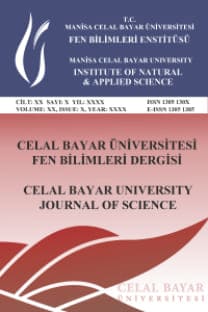Yeşil Tedarik Zinciri Yönetiminde Ağ Optimizasyonu Problemine Meta-Sezgisel Yaklaşım
Meta-Heuristic Approach for Network Optimization Problem in Green Supply Chain Management
___
- [1] Srivastava, S.K. Green Supply Chain Management: A State-of-the-Art Literature Review. Int. J. Manag. Rev. 2007; 9(1), 53-80.
- [2] Govindan, K.; Khodaverdi R.; Vafadarnikjoo, A. Intuitionistic Fuzzy Based DEMATEL Method for Developing Green Practices and Performances in a Green Supply Chain. Expert Syst. Appl. 2015; 42, 7207-7220.
- [3] Wang, F.; Lai, X.; Shi, N. A Multi-Objective Optimization for Green Supply Chain Network Design. Decis. Support Syst. 2011; 51, 262-269.
- [4] Eskandarpour, M.; Dejax, P.; Miemczyk, J.; Péton, O. Sustainable Supply Chain Network Design: An Optimization-Oriented Review. Omega-Int. J. Manage. S. 2015; 54, 11-32.
- [5] Pishvaee, M.S.; Razmi, J. Environmental Supply Chain Network Design Using Multi-Objective Fuzzy Mathematical Programming. Appl. Math. Model. 2012; 36, 3433-3446.
- [6] Jamshidi, R.; Fatemi Ghomi, S.M.T.; Karimi, B. MultiObjective Green Supply Chain Optimization with a New Hybrid Memetic Algorithm Using the Taguchi Method. Sci. Iran. E. 2012; 19(6), 1876-1886.
- [7] Elhedhli, S.; Merrick, R. Green Supply Chain Network Design to Reduce Carbon Emissions. Transport. Res. D-Tr. E. 2012; 17, 370-379.
- [8] Mallidis, I.; Vlachos, D.; Iakovou, E.; Dekker, R. Design and Planning for Green Global Supply Chains Under Periodic Review Replenishment Policies. Transport. Res. ELog. 2014; 72, 210-235.
- [9] Fahimnia, B.; Sarkis, J.; Eshragh, A. A Tradeoff Model for Green Supply Chain Planning: A Leanness-VersusGreenness Analysis. Omega-Int. J. Manage. S. 2015; 54, 173- 190.
- [10] Govindan, K.; Jafarian, A.; Nourbakhsh, V. Bi-Objective Integrating Sustainable Order Allocation and Sustainable Supply Chain Network Strategic Design with Stochastic Demand Using a Novel Robust Hybrid Multi-Objective Metaheuristic. Comput. Oper. Res. 2015; 62, 112-130.
- [11] Martí, J. M. C.; Tancrez, J-S.; Seifert, R.W. Carbon Footprint and Responsiveness Trade-Offs in Supply Chain Network Design. Int. J. Prod. Econ. 2015; 166, 129-142.
- [12] Tognetti, A.; Grosse-Ruyken, P.T.; Wagner, S. M. Green Supply Chain Network Optimization and the Trade-Off Between Environmental and Economic Objectives. Int. J. Prod. Econ. 2015; 170, 385-392.
- [13] Coskun, S.; Ozgur, L.; Polat, O.; Gungor, A. A model Proposal for Green Supply Chain Network Design Based on Consumer Segmentation. J. Clean. Prod. 2016; 110, 149-157.
- [14] Chibeles-Martins, N.; Pinto-Varela, T.; Barbosa-Póvoa, A.P.; Novais, A.Q. A Multi-Objective Meta-Heuristic Approach for the Design and Planning of Green Supply Chains-MBSA. Expert Syst. Appl. 2016; 47, 71-84.
- [15] Eberhart, R.C.; Kennedy, J. A New Optimizer Using Particle Swarm Theory, Sixth Symposium on Micro Machine and Human Science, Nagoya Municipal Industrial Research Institute, Nagoya, Japan. October 4-6, 1995.
- [16] Kiranyaz, S.; Ince, T.; Gabbouj, M. Multidimensional Particle Swarm Optimization for Machine Learning and Pattern Recognition; Springer-Verlag, New York, USA, 2014; 321 pp.
- [17] Gen, M.; Altiparmak, F.; Lin, L. A Genetic Algorithm for Two-Stage Transportation Problem Using Priority-Based Encoding. OR Spectrum. 2006; 28, 337-354.
- [18] Kadadevaramath, R.S.; Chen, J.C.H.; Latha Shankar, B.; Rameshkumar, K. Application of Particle Swarm Intelligence Algorithms in Supply Chain Network Architecture Optimization. Expert Syst. Appl. 2012; 39, 10160-10176.
- [19] Latha Shankar, B.; Basavarajappa, S.; Chen, J.C. H.; Kadadevaramath, R.S. Location and Allocation Decisions for Multi-Echelon Supply Chain Network - A MultiObjective Evolutionary Approach. Expert Syst. Appl. 2013; 40, 551-562.
- [20] Goldberg, D.E. Genetic Algorithms in Search, Optimization and Machine Learning; Addison Wesley Longman Inc., Boston, USA, 1989; 412 pp.
- [21] Sastry, K.; Goldberg, D.E.; Kendall, G. Genetic Algorithms. In The Search Methodologies- Introductory Tutorials in Optimization and Decision Support Techniques; Burke, E.K., Kendall, G., Eds.; Springer Science+Business Media, New York, USA, 2014; 93-117.
- [22] Yang, X.S. Nature-Inspired Optimization Algorithms; Elsevier Inc., Waltham, USA, 2014; 300 pp.
- [23] Aksoy A.; Küçükoğlu İ.; Ene S.; Öztürk N. Integrated Emission and Fuel Consumption Calculation Model for Green Supply Chain Management. Procedia - Soc. Behav. Sci. 2014; 109, 1106-1109
- ISSN: 1305-130X
- Yayın Aralığı: 4
- Başlangıç: 2005
- Yayıncı: Manisa Celal Bayar Üniversitesi Fen Bilimleri Enstitüsü
Şevki Akkoca, Süleyman Murat Bağdatlı
Muhammet ÖZDOĞAN, Lütfü NAMLI, Bilal SUNGUR, Bahattin TOPALOĞLU, Aydın DURMUŞ
Nurşen Saklakoğlu, Simge Gençalp İrizalp, Gizem İldaş, Selçuk Demirok
Üç Boyutlu Yerleşke Modelleme; Mustafa Kemal Üniversitesi Tayfur Ata Sökmen Yerleşkesi Örneği
Aysel Gürkan, Aylin Salıcı, Kutay Yıldırım, Müşerref Yıldırım
Rajesh Kumar MUNAGANTİ, Vijayalakshmi MUVVA, Mustafa OSKAY, Mani Deepa INDUPALLİ
